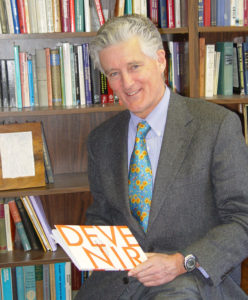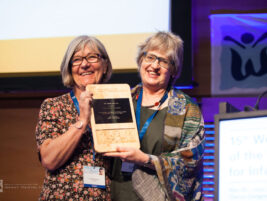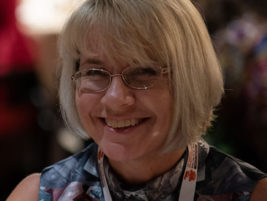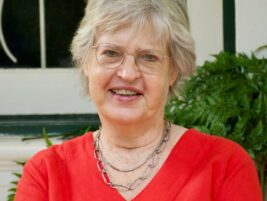The title of “Honorary President” may be conferred to honor a distinguished person who has made an outstanding contribution to the interdisciplinary field of Infant Mental Health. Section 13, WAIMH Bylaws.
In July 2006, Robert (“Bob”) Emde became the first individual to be designated by the WAIMH Board of Directors as Honorary President. As indicated by the bylaw section cited at the lead of this article, Bob Emde’s contributions to the field of infant mental health have been broad, deep, and long-standing and his sphere of influence spans decades, continents, and disciplines. Moreover, this sphere encompasses scientific, clinical, and policy-practice issues.
Born in Orange, New Jersey in 1935, Bob’s academic entry into infant mental health began at Brown University, where he graduated cum laude with a major in sociology, and then at Columbia University College of Physicians, where he earned the doctoral degree in medicine. Bob then began to move west: an internship in medicine at the University of Minnesota Hospitals was followed in 1961 by an residency in psychiatry at the University of Colorado School of Medicine, a state and institution that have been a part of his life to the present.
Bob Emde is currently Emeritus Professor of Psychiatry at the University of Colorado Health Sciences Center. He serves as Scientific Advisor for the World Association for Infant Mental Health. He was President of the World Association for Infant Psychiatry and Allied Disciplines (WAIPAD) when plans to merge WAIPAD and the International Association for Infant Mental Health were first discussed and planned. He has served on the Board of Directors of Zero to Three since 1982 and is Chair of the task force charged with revision of the Diagnostic Classification: 0-3 system, and a member of the Executive Committee for the Board of Directors. Bob was elected President of the Society for Research in Child Development, the world’s largest scientific organization focused solely on issues related to child development. Beyond extensive occasional reviewing for a wide range of journals, Bob was editor of the SRCD Monographs, Associate Editor of Review of Child Development Research, Journal of the American Psychoanalytic Association, and Psychiatry, and currently is on the editorial board of the International Journal of Psycho-Analysis. He also is Scientific Advisor for the Board of Professional Standards of the American Psychoanalytic Association and is Head of the College of Research Fellows of the International Psychoanalytic Association (at the University of London).
A recipient of NIMH Research Science Awards over a 30 year period, Bob has been awarded Distinguished Life Fellow status by the American Psychiatric Association. In 1996 he received the WAIMH Award for distinguished contributions to the field of infant mental health, and in 2006 received the Rene A. Spitz Award in recognition of significant life time contributions to clinical and empirical research on topics related to infant mental health. In 2007 he was honored with the David Dean Brockman Award by the American College of Psychoanalysts for distinguished research in psychoanalysis. Bob has served as a visiting professor in 22 countries. His list of post-doctoral fellows includes such an impressive list of scholars that is it worthy to mention them all: James Sorce, Ann Easterbrooks, Helen Buchsbaum, Zeynep Biringen, David Oppenheim, Michael Sherman, Richard Bingham, Robert Clyman, Susan Warren, Loraine Kubicek, Stephanie Schmitz, Kimberly Kelsay, and Kevin Everhart. He also mentored research scientist development awards for Robert Harman, Theodore Gaensbauer, and David Mrazek, and chaired 11 doctoral dissertations at the University of Denver and University of Colorado-Boulder.
Bob’s scientific career has focused on the organization of human emotions in the early years of postnatal life, the psychobiological behaviors regulating the organization of parent (mother and father) infant relationships, and the impact of emotions on individual and family life. His work was instrumental in documenting the infant’s use of social referencing as a way to “read” parental emotional states as feedback to internalized affective reactions to environmental events (e.g., falling and hitting one’s head on a table, looking at parents to “read” their emotional reaction, and then making a “decision” how to overtly express
pain, or reading parental emotional expressions when venturing out to explore the environment to determine whether such ventures are safe or threatening). Bob’s work illustrates how these regulatory behaviors affect the quality of family interactions in typical families as well as those characterized by parental psychopathology and/or children’s developmental disabilities. His work linking parental and infant signal systems and assessing their impact on the organization of behavior during the first five years of life has had a profound impact on understanding the importance of the organization of brain-behavior relationships early in human life.
Consistent with the traditions of Rene Spitz and Adolf Meyer, Bob’s work has always been interdisciplinary as evidenced by his leadership of the Developmental Psychobiology Group (DPG). The DPG, sponsored by the University of Colorado Health Sciences Center with endowed foundation support, meets biennially at Estes Park, co. Each meeting includes presenters from several disciplines addressing a common content area, and each of three days is devoted to rich discussion about national and international research and policy implications. Sessions devoted to mentoring reflect one of Bob’s broad commitments within infant mental health, namely, to help guide young investigation onto life cource pathways that will intergenerational transitions in the leadership of infant mental health.
Bob’s ability to work cohesively with scientists from many disciplines was one of many talents that led to his selection to chair three major national research projects, two of which were funded by the MacArthur Foundation, and one by the Administration for Children, Youth, and Families. The MacAuthor Foundation Research Network involved over 60 senior investigators assembled to study the transition from infancy to early childhood (1982-1987). This was followed by service as chair of the MacAuthur Foundation Research Network on Early Childhood Transitions (1987-1992) and involved work with a similar group of senior scientists. Finally, when the National Consortium for the Evaluation of Early Head Start needed a leader to oversee the Transitions from Preschool to Kindergarten follow-up study it turned to Bob to hold together the 17 national sites and nearly 50 senior investigators connected to the project. The work generated by each of the national efforts has provided extraordinary understandings about early life transitions, and in the case of EHS, vital information about the impact of a prevention program (EHS) that now enrolls over 70,000 children nationwide.

The impact of Robert Emde’s scientific work, his national contributions to the study of early human development, his broad interdisciplinary and international presence, and the extraordinary influence he has had on the lives of young investigators worldwide are all components of the recognition that WAIMH intended by awarding him the title of Honorary President. But all of his scientific, clinical, and policy work provide only an outer view of Bob Emde in his various professional roles. The inner view provides deeper insight into Bob’s humanity, his compassion, zest for life, wonderful sense of humor, exuberance, dedication to family, creative expression, and a generous dash of boyish devilment!
It was my great pleasure to meet Bob in 1965 when he was Chief Resident in Psychiatry at the University of Colorado School of Medicine and I was a doctoral candidate at the University of Denver. Our casual acquaintance has grown over the 40 plus years into a personal friendship, and to extensive professional collaborations that continue to this day. I was delighted to be able to present him with the Honorary President Award at the WAIMH World Congress in Paris, an award that he so markedly deserves and which expresses the world-wide respect Robert N. Emde has earned for worthy and extraordinary contributions to the field of infant mental health.
Robert N. Emde, Honorary President. By the Red Cedar column.
Authors
Fitzgerald, Hiram, Ph.D.
Executive Director, WAIMH
USA








